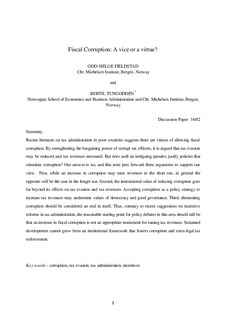| dc.description.abstract | Recent literature on tax administration in poor countries suggests there are virtues of allowing fiscal
corruption. By strengthening the bargaining power of corrupt tax officers, it is argued that tax evasion
may be reduced and tax revenues increased. But does such an intriguing paradox justify policies that
stimulate corruption? Our answer is no, and this note puts forward three arguments to support our
view. First, while an increase in corruption may raise revenues in the short run, in general the
opposite will be the case in the longer run. Second, the instrumental value of reducing corruption goes
far beyond its effects on tax evasion and tax revenues. Accepting corruption as a policy strategy to
increase tax revenues may undermine values of democracy and good governance. Third, eliminating
corruption should be considered an end in itself. Thus, contrary to recent suggestions on incentive
reforms in tax administration, the reasonable starting point for policy debates in this area should still be
that an increase in fiscal corruption is not an appropriate instrument for raising tax revenues. Sustained
development cannot grow from an institutional framework that fosters corruption and extra-legal tax enforcement. | en |
